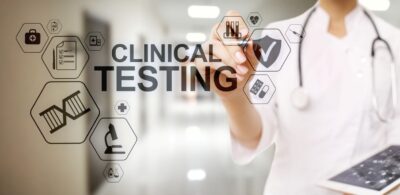Provider organizations, payer organizations, and healthcare companies typically use legacy IT business models. While these systems are traditionally reliable, they’re notoriously difficult to upgrade and connect to other systems. They can also inhibit collaboration between vendors and partners.
The good news is, evolving hybrid solutions can simplify the overall IT footprint and reduce unnecessary complexity. Digital transformation offers healthcare innovation that can keep technology on par with science. Moreover, new technologies should enable FAIR data and processes — better findability, accessibility, interoperability, and reuse of digital assets.

What is Digital Transformation?
Digital transformation is a process. It involves adoptive and adaptive innovation in which organizations find and incorporate technology products. The idea is to replace outdated or manual processes and technologies with new digital technologies.
New technologies can help develop new revenue streams, investment strategies, and payment options. Digital transformation can also mean new self-serve purchasing options, digital products, content streaming, AI-enabled CRM systems, and product personalization. In terms of innovation in healthcare, pharma, and other life sciences, digital transformation must also keep technology on par with science.
Digital Transformation in Healthcare
The goals for digital transformation in healthcare are flexible, scalable, efficient, and streamlined scientific business processes. Healthcare, pharma, and other life sciences organizations can reach these goals. However, Endpoints News says only a few scientific IT platforms can span discovery through product production.
Ultimately, reproducibility in science, model-quality data, knowledge bases, and tech transfer should work together. The quality data model (QDM) is a standardized format that measures electronic quality performance. Electronic Health Record systems can utilize QDM to ensure broad stakeholder collaboration in development.
Additionally, a QDM can maintain consistency in requests and storage and efficiently convey clinical information. Today, the goal is to make entire organizations more adaptable through technology and collaboration. And adaptability is more important than ever in life sciences, pharma, and healthcare.
Digital transformation disrupts these industries and provides opportunities to build composable healthcare organizations with flexible infrastructures. Ultimately, a unified platform acts as an ecosystem that continually adds new business applications, scientific content, and other capabilities.
Create a Composable Healthcare Organization
Cloud platforms can replace antiquated tools and legacy systems with composable architecture that offers flexibility and preparedness. The unified platform effectively acts as a blueprint. Additionally, these new technologies provide healthcare organizations with an opportunity to reduce their IT footprint.
A QDM provides language-defining criteria for clinical quality measurement. The electronic definition of a clinical concept using data elements provides the vocabulary relating aspects to one another by connecting data attributes to clinical factors and using filtering functions. The QDM can construct complex clinical representations.
These composable systems can drive efficiency and reduce costs associated with disconnected legacy IT. For example, L7|ESP is a QDM that stands out as a Next-Generation platform. It provides reusable, FAIR-compliant building blocks with well-defined scientific business processes. It also allows organizations to combine processes with data models.
Implementing the platform depends on the current type of complexity of a unique IT environment and L7| ESP’s role. However, the system can generally be operational in weeks, providing opportunities for pharma and healthcare products to get to market faster.
Collaborate With IT Professionals
It can be challenging to transform an outdated legacy system, but data transformation happens in steps. Organizations can guarantee success by partnering with reliable IT professionals. At DMI, our experts offer a detailed review of organizational data management.
We evaluate historical data health, including:
- Data infrastructure
- Architecture
- Data use
- Data Science
We also consult on data culture, including team skills and resources. Then, we supply a personalization scorecard to assess and capture organizational readiness.
Machine learning and AI can benefit pharma, life sciences, and healthcare organizations. However, how innovation can help a business isn’t always as straightforward without an evaluation. At DMI, we understand the digital transformation process and how to use AI to assist human decision-makers.

Redefining Healthcare Sector Through Technology
Healthcare institutions and medical professionals traditionally rely on legacy systems that are sturdy but lack flexibility. In an age where adaptability is crucial, it is essential to understand the impact of technological advancements and how they can revolutionize healthcare. Aligning healthcare technology with science is essential to improve health outcomes, optimize processes, and enhance the patient experience.
Here are some ways to keep your technology on par with science:
Integrated Technology Systems
Integrating systems is one of the keys to keeping technology on par with science. Healthcare providers can enhance collaboration, health services, streamline data sharing, and promote innovation through seamless integration. Integrated technology systems encompass Electronic Health Records (EHR), telemedicine, AI-powered diagnostics, and advanced data analytics, all of which contribute to a holistic approach to patient care.
Investing in Data-Centric Technologies
Data lies at the heart of innovation. Healthcare organizations must invest in technologies that focus on data management and analytics. High-quality data-driven insights support decision-making and pave the way for personalized patient care. This includes adopting Cloud Computing for secure data storage, Big Data Analytics for insights, and AI for predictive analysis.
Encourage Interoperability
To keep technology in sync with science, promoting interoperability is essential. It ensures that different healthcare systems and software applications can communicate, exchange data, and use the information exchanged. FHIR (Fast Healthcare Interoperability Resources) is an example of a standard that helps achieve this by enabling the exchange of healthcare information electronically.
Empowering Patients Through Healthcare Innovations
Empowering patients by involving them in decision-making and giving them access to their health data is a powerful way to improve outcomes. Patient portals and mobile apps allow patients to participate in their healthcare journey actively. Informed patients are more likely to adhere to treatment plans and make decisions that positively impact their health.
Mobile Health Applications
The ubiquity of smartphones has opened up a new avenue in healthcare through mobile health applications. These applications enable remote monitoring, virtual consultations, and access to health records, making healthcare more accessible and efficient. Incorporating mobile health applications into the healthcare ecosystem is a step towards aligning technology with ongoing scientific developments.
Telehealth
Telehealth services have gained prominence, especially after the global health crisis. By leveraging technology, telehealth services bridge geographical gaps, making healthcare accessible to those in remote locations. They also allow for the efficient exchange of information among healthcare professionals, contributing to a more integrated approach to healthcare delivery.
Artificial Intelligence and Machine Learning
The role of AI and Machine Learning in healthcare cannot be overstated. These technologies are at the forefront of healthcare innovation. They assist in diagnostics, predictive analytics and enhance decision-making processes. Investing in AI and Machine Learning is indispensable for healthcare institutions striving to keep their technology up-to-date with scientific advancements.
Developing the Healthcare Workforce
Technology is only as good as the people who use it. Investing in the training and development of the healthcare workforce is essential. Staff must have the knowledge and skills to use new technologies effectively. Furthermore, fostering a culture of innovation and continuous learning is crucial for the long-term adaptation of technological advances.
Incorporating Blockchain for Enhanced Data Security
As healthcare organizations adopt new technologies, ensuring the security and privacy of patient data is paramount. Developing robust security protocols and adhering to regulatory standards, such as HIPAA, is imperative to safeguard sensitive information and maintain patient trust.
Blockchain technology offers unprecedented opportunities for securing patient data and enhancing the integrity of health information exchanges. By decentralizing data storage, Blockchain reduces the risk of breaches and ensures the authenticity of patient records. Implementing this technology is integral to developing a secure, efficient, modern healthcare infrastructure.
Harnessing the Internet of Medical Things (IoMT)
The Internet of Medical Things (IoMT) is a network of interconnected medical devices and applications that communicate and exchange data. From wearable fitness trackers to smart hospital beds, IoMT devices are revolutionizing patient care by providing real-time data to healthcare professionals. This continuous data stream allows for more accurate diagnoses, personalized treatment plans, and improved patient monitoring.
Precision Medicine: Personalizing Treatment Plans
Precision medicine involves tailoring medical treatment to the individual characteristics of each patient. By analyzing a patient’s genetic makeup, lifestyle, and environment, healthcare professionals can develop highly personalized treatment plans. Integrating genomics and data analytics into healthcare practices is crucial in realizing the full potential of precision medicine.
Enhancing Patient Experience Through Virtual Reality (VR)
Virtual reality (VR) is no longer just a tool for entertainment; it’s becoming an integral part of patient care. VR can be used for pain management, rehabilitation, and surgical training. By immersing patients in a virtual environment, VR can alleviate pain, reduce anxiety, and improve therapy outcomes. Investing in VR technology is an innovative way for healthcare organizations to enhance patient care and stay at the forefront of technological advancement.
Leveraging Robotic Process Automation (RPA)
RPA in healthcare can streamline administrative tasks, process claims more efficiently, and reduce costs. By automating repetitive tasks, healthcare professionals can focus more on patient care. Implementing RPA is a step towards optimizing operations and aligning technological advancements with organizational goals.

How DMI Can Help
Staying in tandem with scientific advancements through healthcare innovation is an ongoing journey. Healthcare organizations must be proactive, adaptive, and open to embracing new technologies. This requires continuous investments, workforce training, data management, and a keen eye on regulatory compliance.
As we stand at the cusp of a technological revolution in healthcare, the integration of AI, Blockchain, IoMT, and other technologies can drive monumental changes in patient care and operational efficiency. It is incumbent upon healthcare organizations to adopt these innovations, not just for the betterment of patient care but for the sustenance and growth of the healthcare industry.
Remember, healthcare innovation is not an option; it is a necessity. Partnering with seasoned experts like DMI can help organizations navigate the complexities of this transformative journey efficiently and effectively.
DMI uses innovation to help healthcare organizations keep their technology on par with science. Connect with us online to discover how we can help with your organization’s digital transformation.
[hubspot type=cta portal=8444324 id=79fda376-965e-472a-ac01-a2481bfe4cde]

